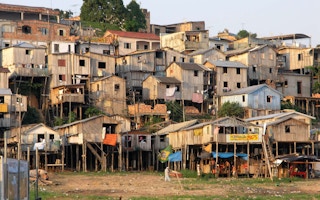I would never belittle the suffering in the Asian nations and western democracies that have been at the epicentre of the coronavirus pandemic. Thousands of people have unnecessarily lost their lives. Many more face grave uncertainty over their livelihoods.
However it is simply not true, as some say, that this virus is a great leveller. The poorest, most vulnerable countries are facing disaster unlike anything richer states have seen.
How will infections be contained in crowded South African townships, ramshackle Brazilian favelas or Bangladeshi refugee camps? How will public handwashing campaigns help in villages with little access to running water?
Sierra Leone has just one ventilator for 7.5 million people. Worldwide, over 800 million people already go to bed hungry each night. Now pandemic-triggered trade restrictions threaten to deny low-income, import-reliant countries access to food, many in Sub-Saharan Africa.
Few understand the tragedy looming over developing countries better than the civil society organisations working with them. International charities and local community groups manned by selfless volunteers know a heroic effort is required to stop this health crisis turning into humanitarian catastrophe.
Yet many are being forced to down tools, precisely when we need them most.
“
With diminished resources and one hand tied behind their backs, many organisations are having to making heart-breaking decisions about where to continue their work.
For many donations have fallen off a cliff, while state rescue packages have prioritised businesses and workers. In the UK and elsewhere, billions in projected income will be lost in the coming weeks, including because of charity shop closures and the cancellation of major fundraising events, such as the London Marathon.
Restricted travel, disrupted supply chains and protectionist export controls are making it impossible to send in surge teams and vital equipment, as you would in other emergencies. Many international NGOs are having to rely fully on networks of local partners, which vary massively from one place to the next.
With diminished resources and one hand tied behind their backs, many organisations are having to making heart-breaking decisions about where to continue their work. Some will undoubtedly go bust.
The situation is dire. Yet the humanitarian sector is struggling to issue a full-throated call for help. Privately, charities say they don’t feel they have permission to highlight suffering abroad, with so much at home. It’s not easy to lobby for foreigners when so many citizens are facing hardship.
But this is a false distinction. Against a highly-contagious and border-blind virus, our collective defence is only as strong as our weakest nations. In many of these places, these organisations stand shoulder-to-shoulder with the state, right on the coronavirus frontline.
Often they are the connective tissue between local populations and national and international institutions, deep-rooted into the communities serve and able to move more quickly than the authorities. Especially where authorities are chaotic, fragmented or corrupt.
Medicins Sans Frontieres is bolstering official healthcare systems in dozens of affected states. Against the odds, Oxfam staff and volunteers are still managing to deliver water, soap and public health advice to communities with few other lifelines.
Countless others are working tirelessly to provide basic infrastructure and supplies.
And when the immediate health pressures pass, they will be critical in rebuilding shattered societies. A good friend runs IAMTHECODE, an extraordinary organisation which, among other things, teaches computer programming to slum-dwelling African girls.
“Who”, she asked, “will educate the next generation so they can finally build economies resilient enough to stand the endless crises? We can’t rely on the governments, it’s going to be up to us”.
Of course, boosting civil society is no substitute for comprehensive international support for developing states. Over 80 have already approached the IMF for emergency assistance, not least because of record capital outflows and the collapse in tourism.
The capacity of the IMF and other international financial institutions will need to be increased to fast-track finance direct to the people who need it. Debt relief is urgent. Export restrictions must be eased to enable the flow of humanitarian deliveries and supplies.
We need a commitment that, once found, vaccines and treatments will be available to low and middle income states.
In parallel, if we can shore up our humanitarian sector we will be far better placed to limit the global damage wrought by Covid-19. Private donations help. So can business, by resisting the temptation to reduce philanthropy budgets and mobilising global supply chains. Ultimately governments must step in.
Doing so is morally right, to help mitigate the tsunami heading towards millions of our fellow human beings. It’s also in the enlightened self-interest of wealthier countries. We know from terrorism and the refugee crisis how quickly instability in the developing world has consequences on our streets.
So far, voluntary organisations have been virtually absent from state bailouts. This includes in the UK, despite calls for emergency support. This terrible oversight must be corrected without delay.
The longer we forget our humanitarians, the greater the price paid by the poorest nations. In our shared battle against coronavirus, we need their expert knowledge, extensive networks and profound dedication fully in the fight.
This story was published with permission from Thomson Reuters Foundation, the charitable arm of Thomson Reuters, that covers humanitarian news, climate change, resilience, women’s rights, trafficking and property rights. Visit http://news.trust.org/climate.






















